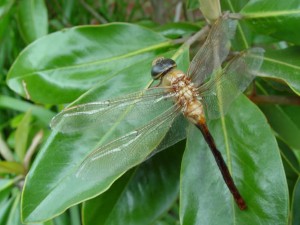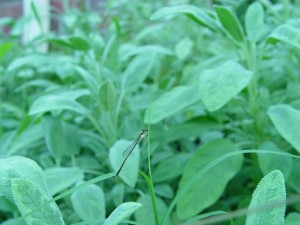Watch them flitter… Dragonflies and damselflies, also called “darning needles” and “dining needles”, are common spring/summer inhabitants in many U.S. gardens, particularly around water gardens, streams and other water features, where they reproduce. Adults lay eggs on the plants around the water’s edge; the nymphs hatch from the eggs and live under water for months or years before they mature and fly. These insects are in the order Odonata.
Dragonflies and damselflies are beneficial insects and delightful to watch. Young children enjoy seeing them flit around reeds, lilypads, and flowers; children frequently cause panic when they fly to close. However, they do not sting or bite people. Dragonflies and damselflies are predators of other insects, including mosquitoes and beetles. They have excellent eyesight and are fast nimble fliers.
Both dragonflies and damselflies tend to stay close to where they were born. Key differences between them is that dragonflies rest with their wings held open; damselflies fold their wings back over their abdomens while resting. Some people refer to dragonfly nymphs (immatures) as “skimmers”.
Dragonflies live around water ponds and features, such as a large urn or half whiskey barrel filled with water. Dragonflies are most active on warm spring and summer days. They prefer ponds with plants growing in or around it where the nymphs can hide and hunt. Young fliers will rest (bask) on rocks and twiggy shrubs; tall cattails, reeds and grasses are great places to perch on.
Dragonflies and damselflies are an important food source for various birds. Pond fish or frogs will prey on the nymphs.
Credit: idea for blog originates from writings of Rick Darke and Doug Tallamy whose books on garden ecology should be general reading for children and adults.



 Posted in
Posted in 
